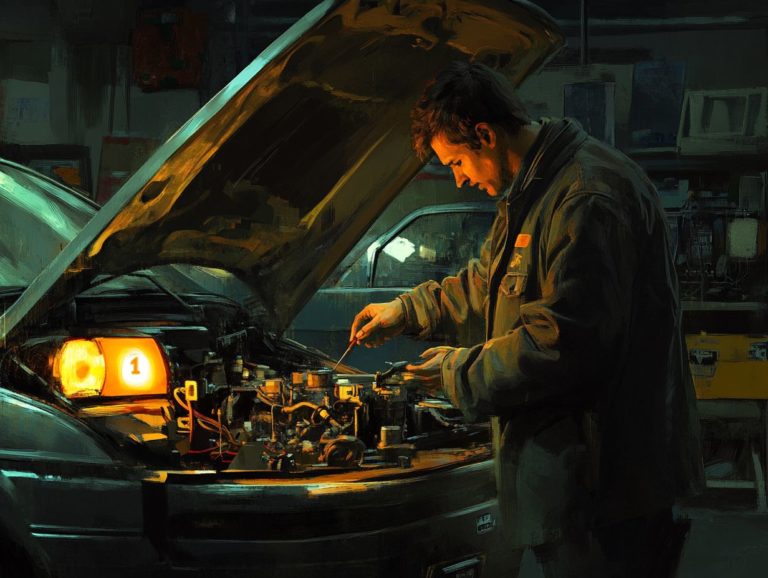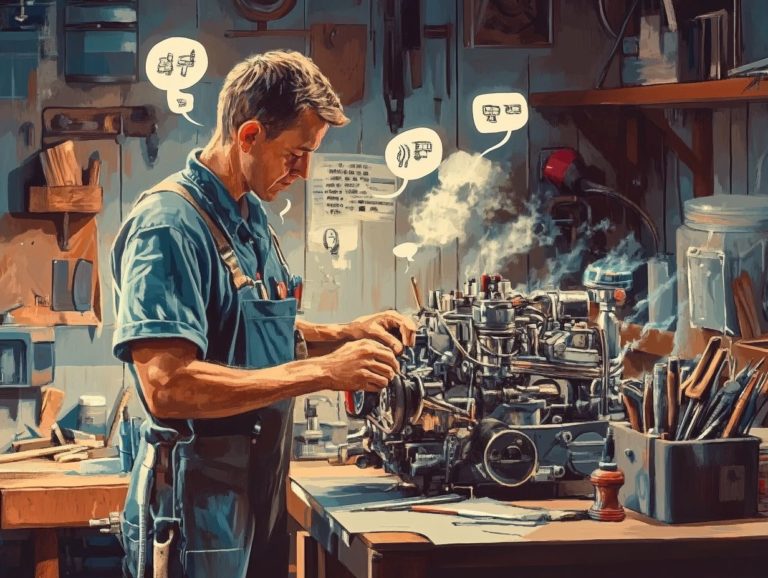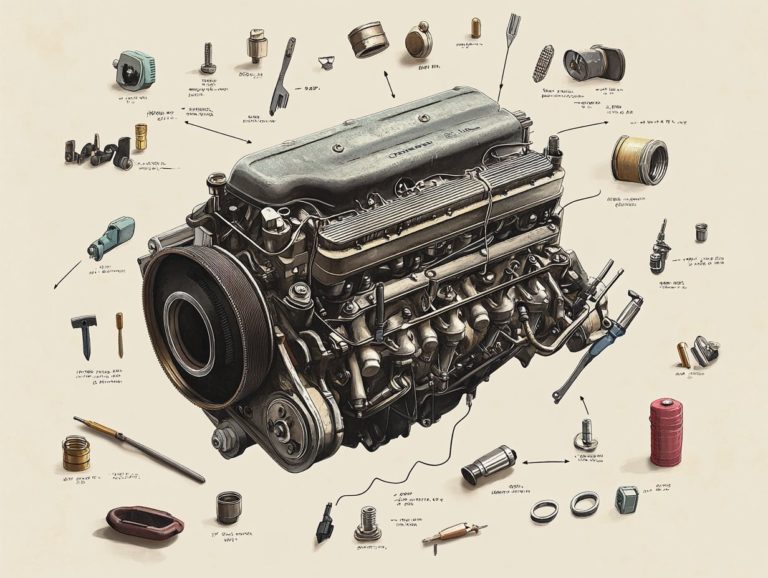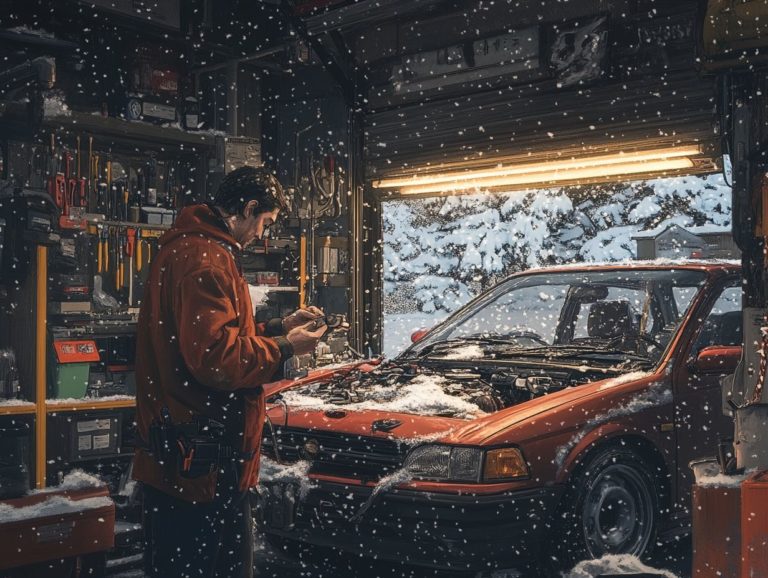5 Common Mistakes in DIY Car Repairs
DIY car repairs can be a satisfying way to save some cash while deepening your understanding of your vehicle. However, it’s crucial to recognize that there are common pitfalls that could lead to unnecessary frustration and costly blunders.
From lacking the right tools to neglecting essential safety precautions, many DIY enthusiasts may inadvertently pave their own path to trouble.
This guide delves into five key mistakes you should avoid, outlines when it’s wise to tackle repairs on your own, and highlights the advantages of consulting a professional mechanic.
Whether you’re a seasoned DIY aficionado or just beginning your journey, this information will empower you to navigate the realm of car repairs with confidence.
Contents
- Key Takeaways:
- 1. Not Having the Right Tools and Equipment
- 2. Skipping Proper Safety Precautions
- 3. Not Understanding the Problem
- 4. Using Incorrect Parts or Techniques
- 5. Not Following Proper Maintenance Procedures
- When Is It Okay to Attempt a DIY Car Repair?
- Frequently Asked Questions
- What are the 5 common mistakes people make when attempting DIY car repairs?
- How can not having the proper tools affect DIY car repairs?
- What are some safety precautions to keep in mind when attempting DIY car repairs?
- Why is it important to follow the correct repair procedures when attempting DIY car repairs?
- How can relying on unreliable sources affect DIY car repairs?
- Why is it not recommended to attempt complex car repairs without proper knowledge?
Key Takeaways:
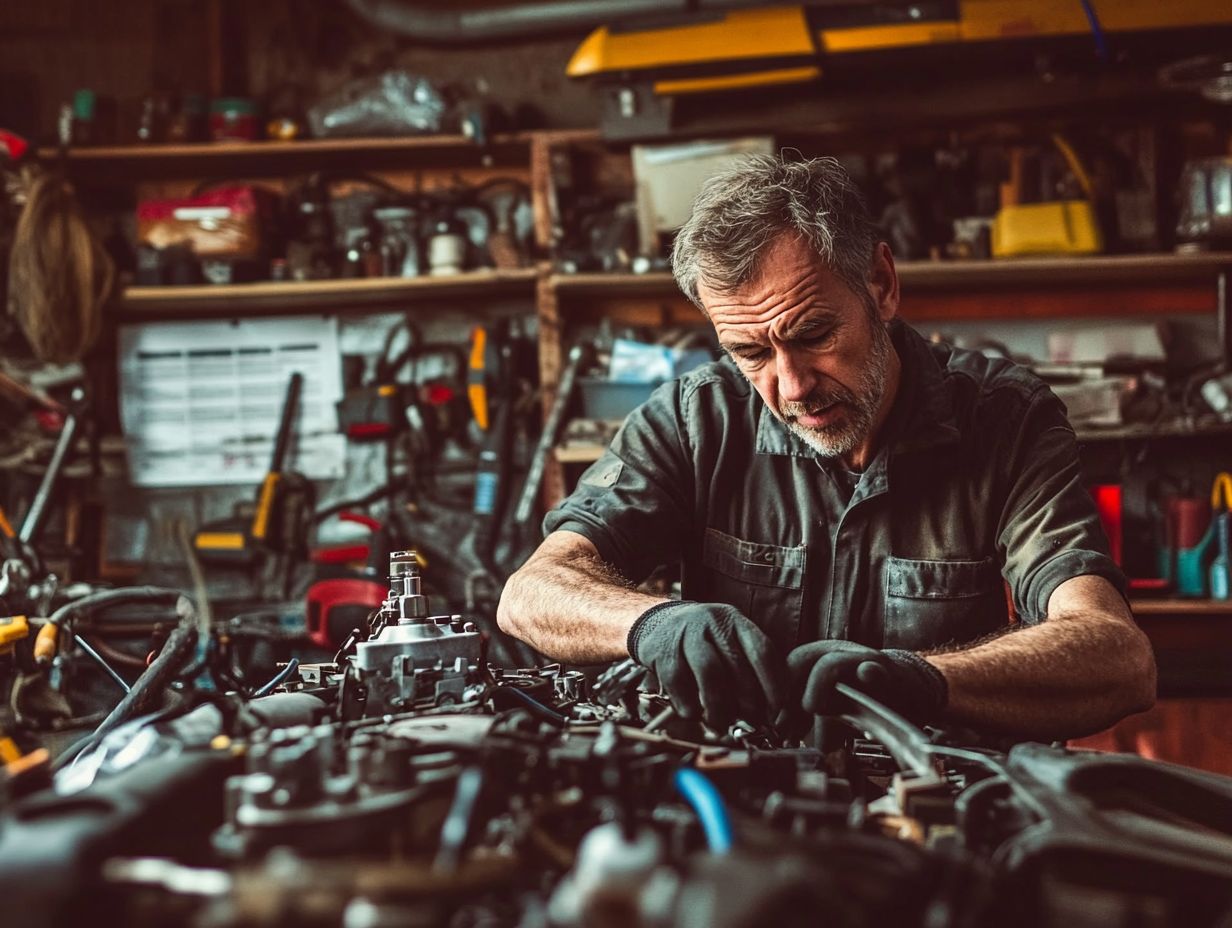
- Not having the correct tools and equipment for DIY car repairs can lead to mistakes and further damage to your vehicle.
- Skipping safety precautions can result in serious injuries, even for small repairs. Always wear proper protective gear and follow safety guidelines.
- It’s important to fully understand the problem before attempting a DIY repair. Research and consult with professionals if needed to avoid making the issue worse.
1. Not Having the Right Tools and Equipment
One of the most critical elements of successful DIY car repairs is ensuring you have the right tools and equipment. Without proper repair tools, you risk ineffective fixes and high repair costs.
This is especially true for complex tasks like brake repairs and timing belt replacements. If you find yourself without the necessary tools, including original equipment manufacturer (OEM) parts and a detailed repair manual, you might struggle to complete essential vehicle maintenance, ultimately leading you to rely on professional mechanics.
For example, using a high-quality set of wrenches can transform tasks like changing oil or replacing spark plugs into a far more manageable experience. This significantly reduces the risk of rounding off bolts.
Diagnostic tools, such as OBD-II scanners, are invaluable for pinpointing engine problems that could easily slip under the radar. They allow you to make targeted repairs instead of engaging in guesswork.
Neglecting safety gear including gloves, goggles, and sturdy footwear can expose you to unnecessary risks, such as injuries from sharp objects or hazardous fluids. With the right tools at your disposal, you not only make the repair process smoother and safer but also enhance the overall longevity and performance of your vehicle.
2. Skipping Proper Safety Precautions
Skipping proper safety precautions during your DIY car repairs can lead to serious accidents, costly mistakes, and even life-threatening situations, especially when you’re tackling complex systems like electrical or hydraulic components in modern vehicles. For those with older cars, being aware of the 5 common repairs can also help you stay safe and informed.
Don’t take chances! Always wear the right safety gear to protect yourself from harmful chemicals and potential debris.
For instance, if you neglect to wear gloves while handling engine fluids, you might face severe skin irritation or burns. Similarly, without goggles, you could easily sustain eye damage from flying particles or toxic splashes.
There are countless real-life examples where simple precautions could have drastically altered outcomes. Consider the DIY enthusiast who suffered a severe injury when a vehicle slipped from an unstable jack, resulting in a preventable emergency.
Act now to keep yourself safe! Prioritizing safety boosts both your health and your repair success.
3. Not Understanding the Problem
Not grasping the underlying problem can lead you down a path of misdiagnosis and repair issues in DIY car repairs. To avoid this, it’s important to debunk common misconceptions; for instance, understanding the 5 common myths about car maintenance can help you prevent further engine damage or inflated repair costs if you use the wrong parts or apply incorrect techniques.
To troubleshoot car issues effectively, it s essential to adopt a systematic approach that starts with accurate diagnostics. Consulting automotive manuals offers invaluable guidance on interpreting symptoms correctly.
Many DIY enthusiasts overlook the necessity of verifying symptoms against potential problems, which can lead to common mistakes, such as mistaking electrical failures for fuel system issues. Understanding the 5 common repairs for family vehicles can help prevent unnecessary parts replacements.
By diligently tracking specific signals and analyzing them alongside your vehicle’s manual, you can identify the root cause of malfunctions, ensuring your repairs genuinely address the real issues at hand.
4. Using Incorrect Parts or Techniques
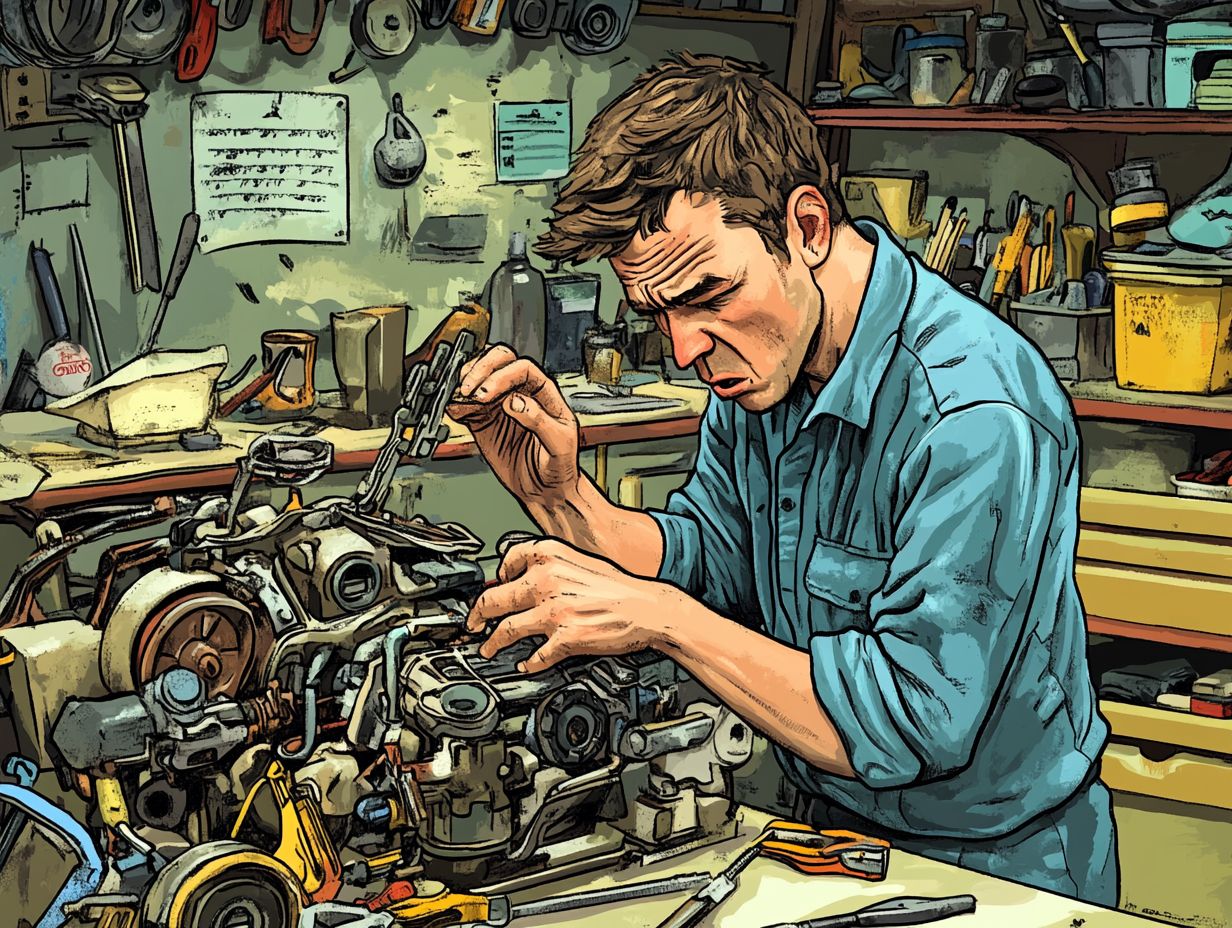
Using the wrong parts or techniques in your DIY car repairs can set off a chain reaction of mistakes, jeopardizing both your vehicle’s safety and functionality while potentially driving up repair costs significantly. To avoid these issues, consider these 5 tips for DIY common car repairs.
Choosing non-OEM parts (Original Equipment Manufacturer) might introduce components that fail to meet the precise specifications essential for optimal performance. For example, installing a low-quality aftermarket timing belt or an incompatible head gasket can lead to serious engine failures, like overheating or valve collisions. These components require exact tolerances; even a minor deviation can spell disaster.
Using the right repair techniques ensures every detail of the installation process adheres to industry standards. Without this expertise, even the highest-quality parts may not perform as intended, leading to further complications and transforming a straightforward repair into an expensive nightmare.
5. Not Following Proper Maintenance Procedures
Ignoring maintenance can lead to major DIY car repair mistakes, but knowing 5 quick fixes for common car issues can help prevent costly repairs and extend the lifespan of your vehicle.
Establishing a well-defined maintenance schedule is essential as a vehicle owner, ensuring optimal performance and longevity. Regularly checking fluid types like oil, coolant, and transmission fluid is critical for preventing internal damage and enhancing efficiency. Addressing brake repairs in a timely manner boosts safety and helps avoid more severe issues in the future.
Consulting repair manuals and adhering to the outlined guidelines gives you a clearer understanding of your car’s specific needs. This proactive strategy can dramatically save you time and money, while guaranteeing a smoother and safer driving experience for years to come.
When Is It Okay to Attempt a DIY Car Repair?
Determining when to embark on a DIY car repair journey requires a thoughtful mix of automotive knowledge, an understanding of the repair strategy, and a candid assessment of your technical abilities. After all, some repairs are best left to professionals to avoid costly missteps and ensure safety.
Before diving into any repair project, consider several key factors. Simple tasks like changing oil or replacing brake pads are often straightforward and can be handled successfully by most enthusiasts armed with a basic toolset. However, more intricate repairs like tackling transmission issues or diagnosing electrical problems typically demand specialized knowledge and equipment that may not be readily available to the average person.
As a home mechanic, weigh the potential time investment, the availability of the right tools, and the necessity for expert guidance against your own skill set. This careful consideration will help you make informed decisions about whether to proceed with a DIY approach or consult a trained professional.
What DIY repair have you been considering? Engage with the content and share your thoughts!
What Are the Most Common DIY Car Repairs?
Some of the most common DIY car repairs you might consider include changing the oil, replacing brake pads, and troubleshooting engine overheating. Before leasing a car, it’s also wise to be aware of 5 common mistakes to avoid in car leasing. These tasks often require just basic automotive knowledge and can save you time and cut down on repair bills, giving you more money for things you love.
You ll typically need fundamental tools like wrenches, oil filters, and jack stands. Additionally, having a reliable repair manual that precisely outlines each step is essential. For example, when replacing brake pads, make sure you have a jack, a lug wrench, and a C-clamp to retract the caliper.
Working carefully is crucial to avoid misalignment or improper installation. These mistakes can create hazardous driving conditions. Accessing online forums or instructional videos for guidance can significantly minimize errors and boost your confidence.
By conducting thorough research, you’ll be well-prepared to tackle these tasks, knowing you re equipped for safe and effective auto repair.
How Can a Person Educate Themselves on Car Repairs?
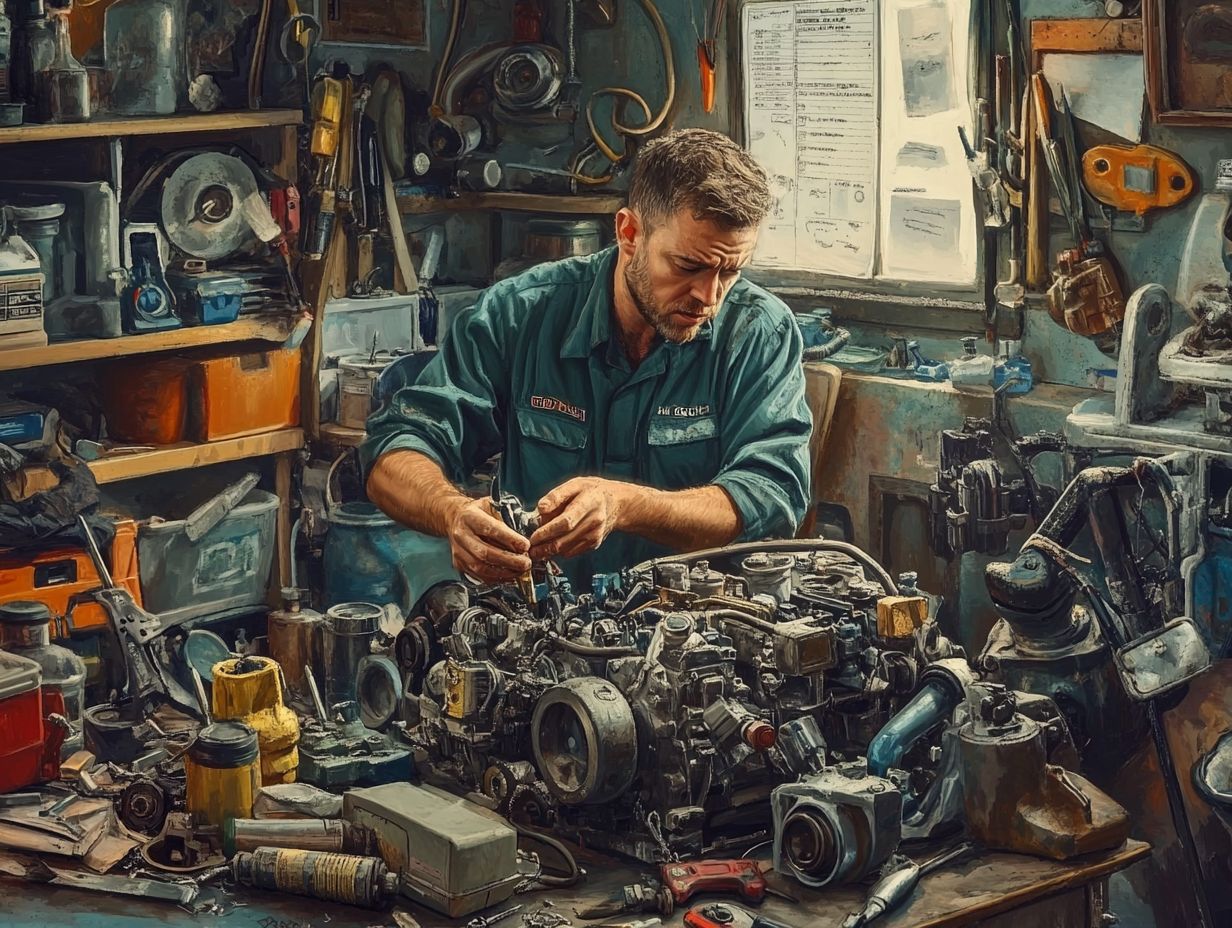
Educating yourself on car repairs can be an enriching journey. It blends the study of repair manuals with online resources and hands-on learning. This approach gives you the power to cultivate the automotive knowledge essential for successful vehicle maintenance.
Service manuals, specifically designed for particular makes and models, act as comprehensive guides that clarify every facet of vehicle repair and upkeep. Reputable websites offer a treasure trove of step-by-step tutorials and videos, providing additional insights and practical advice from seasoned mechanics.
Community forums can prove invaluable as well. They connect you with experienced enthusiasts eager to share tips and troubleshoot problems together. By tapping into these resources, you enhance your learning experience and underscore the importance of reliable information, which is essential for avoiding costly repairs or even safety hazards in the future.
What Are the Risks of Attempting DIY Car Repairs?
Attempting DIY car repairs comes with risks, including the possibility of engine damage, escalating repair costs, and safety hazards, especially when you underestimate the complexity of certain automotive tasks. To help minimize these risks, consider following 5 tips for avoiding common car repairs.
You might feel confident tackling simple fixes like changing a tire or swapping out wiper blades, but it s easy to blur the line between straightforward tasks and more intricate repairs. For example, addressing electrical problems without the right knowledge can lead to malfunctioning systems and even fire hazards.
In these situations, bringing in a professional not only adds a layer of expertise but ensures that repairs are done safely. This method reduces the risk of further complications that can result from taking the DIY route. Act quickly to avoid costly mistakes that could put your safety at risk!
What Are the Benefits of Hiring a Professional for Car Repairs?
Hiring a professional mechanic for car repairs brings a wealth of advantages, including expert knowledge, access to OEM parts, and the peace of mind that comes with repair warranties. This not only saves vehicle owners from costly blunders but also ensures that repairs are of the highest quality.
Take, for instance, a vehicle grappling with complex electrical problems. A skilled mechanic can pinpoint and resolve issues that someone inexperienced might easily miss, preventing further damage and headaches down the road.
Choosing professional repairs often translates to significant time savings. Instead of spending hours troubleshooting or attempting a DIY fix, you can have your car serviced swiftly, allowing you to get back to your busy life without unnecessary delays.
A reliable mechanic stands behind their work, offering reassurance that any future problems stemming from the repair will likely be handled at no extra cost. This reinforces the true value of investing in professional automotive services, elevating your overall driving experience.
How Can One Find a Reliable and Trustworthy Mechanic?
Finding a reliable and trustworthy mechanic is essential for ensuring your car receives quality repairs. The right professional can significantly influence both your repair costs and the overall maintenance of your vehicle.
To navigate this crucial decision, start with online reviews. These offer valuable insights into other customers’ experiences. You can also ask your friends and family for recommendations to find dependable mechanics.
Once you’ve narrowed down your choices, don t hesitate to ask about repair warranties. A warranty not only protects your money but also shows the mechanic’s confidence in their work.
Fostering transparent communication is vital. A good mechanic should take the time to explain repairs clearly, ensuring you feel informed and comfortable. Building trust with your mechanic can lead to a solid long-term relationship, ultimately benefiting both you and your vehicle.
Frequently Asked Questions
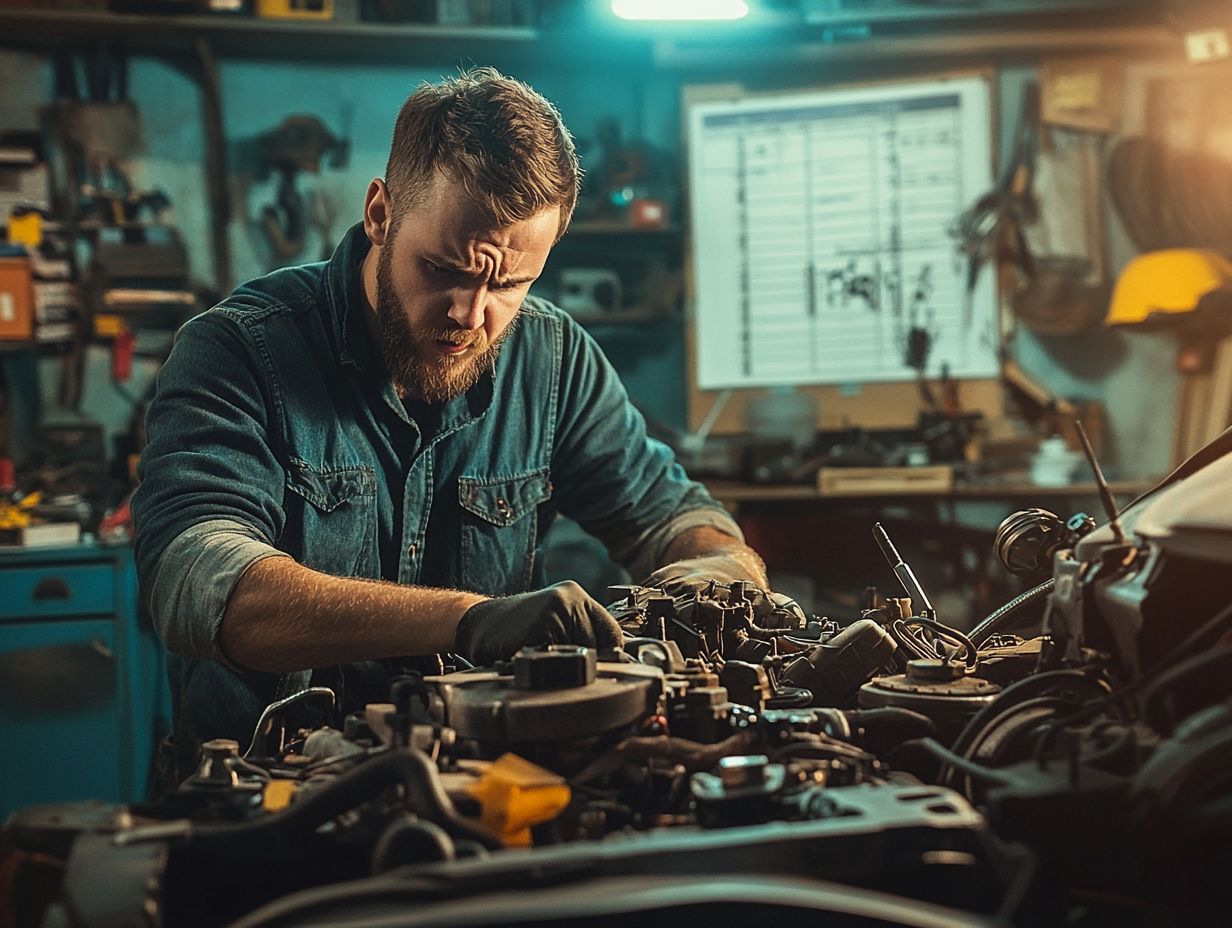
What are the 5 common mistakes people make when attempting DIY car repairs?
Here are five common mistakes to avoid when doing DIY car repairs:
- Not having the proper tools and equipment: Many underestimate the importance of having the right tools, causing more harm than good.
- Skipping necessary safety precautions: DIY car repairs can be dangerous, and failing to take necessary safety precautions can result in injuries.
- Not following the correct repair procedures: Skipping steps or not following the correct procedures can lead to further damage and make repairs more costly.
- Not consulting a reliable source: Relying on inaccurate information from unreliable sources can lead to incorrect repairs and potential damage.
- Trying to fix complex issues without proper knowledge: Some repairs require specific expertise, and doing them without understanding can worsen the problem.
How can not having the proper tools affect DIY car repairs?
Not having the right tools can lead to inefficient repairs and further damage to your car. Be sure to have the right tools ready to tackle the job!
What are some safety precautions to keep in mind when attempting DIY car repairs?
Always wear safety gear, like goggles and gloves, to protect yourself from hazards. Disconnect the car’s battery before starting any repairs and use jack stands to support the vehicle while working underneath it.
Be cautious of hot or sharp parts and always follow instructions carefully to avoid accidents.
Why is it important to follow the correct repair procedures when attempting DIY car repairs?
Following the correct repair procedures ensures the job is done effectively. Skipping steps can lead to further damage and more expensive repairs down the line.
How can relying on unreliable sources affect DIY car repairs?
Relying on inaccurate information can result in incorrect repairs, potentially damaging your car and endangering safety. Always consult a trusted source, like a repair manual or professional mechanic, for accurate guidance.
Why is it not recommended to attempt complex car repairs without proper knowledge?
Some repairs require specific expertise. Don t risk it! Always consult a professional for complex repairs to ensure the safety and proper functioning of your car.

